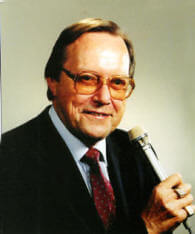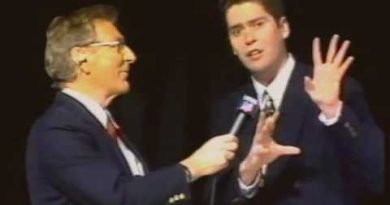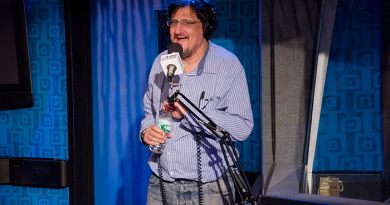Pick My Brain Interview: Bob Allyn
Co-author of Gordon Solie… Something Left Behind
This is a comedy website, but every once in awhile we like to honor wrestling history in a serious, entertaining way. Today is one of those days, because today we’re honoring the legendary Gordon Solie.
Every wrestling fan with any knowledge of the sport knows the name Gordon Solie. For years he was known as the best wrestling announcer in the country, long before Jim Ross ever got into wrestling. Solie’s distinct voice is familiar to anyone watched Florida wrestling, Georgia wrestling, and later, WCW. When WTBS was the king of cable, the voice of the show was Mr.Solie’s.
If you’re a teenager saying, “Gordon who?” then please step aside and let the grown-ups talk. This interview is for the longtime fan, the student of the business, and people who appreciate the icons who shaped the business into what it is today.
Gordon Solie has a new biography coming out, and here to present it is one of the authors, Bob Allyn. It is with pleasure that we introduce Mr. Allyn and the product of 3 years of his hard work and research.
1. First off, please use this opportunity to get all your plugs in. What’s the book about, when is it coming out, where can we get it, and who was involved in writing it?
Gordon Solie…Something Left Behind is a smorgasbord where a variety of people can find something from the buffet to whet their appetite. There are short stories and prose; history from the motorcycle and auto daredevil feats in the 1950’s; history from the 1960’s, 70’s and 80’s televised wrestling; stock car racing from times gone by; 180 images (photos and memorabilia), and even some fiction. My wife, Pam, and I spent three years researching and formatting the images that appear throughout Gordon’s writings. The book is to be released in January and is now be available for pre-orders at www.FloridaBookstore.com and also on internet wrestling web sites. The publisher is Florida Media, Inc. (E. Douglas Cifers, President/Publisher).
2. Next, let’s talk about your personal background. What is your connection to Gordon Solie and to wrestling? Have you written any other books, and where else can we read your work?
I have been married to Gordon’s daughter, Pam, for almost 33 years. Although I coached for 18 years, I was not involved with wrestling. We are previously unpublished authors. Gordon, however, wrote in publications throughout his career and around fifty of Gordon’s previously unpublished writings are included in Gordon Solie…Something Left Behind, and yes…there are more. The fact that we were not involved in wrestling was not a disadvantage. People from the media and professional entertainment, particularly those associated with pro wrestling, were generous with their assistance out of respect for Gordon. It was wonderful to hear their comments. “Whatever you need…Gordon gave me my first announcing lesson”. “Gordon did the very first interview on my show, how can I help?” “Gordon always took the time to listen to me when I was a wrestler.” “Gordon was instrumental when I started my career as a journalist.” “When I first started as a photographer, Gordon helped me considerably, just let me know what I can do.” “Gordon was always approachable”. Pam and I heard this type of comment over and over. We are extremely grateful.
3. Gordon Solie began his wrestling career in 1950, so recapping his life and career into one book must have been extensive. Aside from announcing wrestling, what other sports did Solie announce in the 1950s, and was wrestling his favorite?
Gordon announced a little bit of everything when he started including boxing matches stock car racing and daredevil feats. I believe he favored racing early on, but television propelled his face world wide in wrestling, and the racing broadcasting kind of fell by the wayside. There were EPA pollution concerns about the local race track as Tampa continued to grow and too many seasons with excessive rainouts. When Pam and I worked at the racetrack during one season, one of the best things about being there was listening to Gordon do the live broadcasts for the stock car races.
4. I understand the book contains writings from Solie himself. Are they memoirs? Please tell us a little bit on that, (when they were written, why they were written, and how much was written).
Gordon kept his personal writings over the years in the form of short stories and prose. They were written from the 1940’s through the 90’s. His short stories depict his experiences at the microphone for a variety of sports entertainment. We often found his prose to be deep, provocative, and covering subjects from A to Z such as marriage, divorce, victory, faces, government, religion, greed, death, and much more.
5. While many of today’s wrestling fans may not have heard much of Solie’s announcing work, I’m sure many in the news media (primarily in the Southwest) grew up on Solie and will be very receptive to this book. How has the reaction been so far from those who have read or previewed it? Is the media in Georgia and Florida expressing much interest, or is too soon to tell?
We have had a good response from some credible media people from Florida to California and also Canada about doing book reviews, but we have not sent out the advance review copies yet. On the website www.FloridaMagazine.com, the front cover is now appearing and also on some internet wrestling sites. There will be a write up in the January issue of the Florida Monthly magazine and we have upcoming interviews with radio stations and newspaper columnists. A thirty minute TV documentary has been mentioned as well. It is too early too tell, but so far, so good!
6. Unless you were there, it is difficult to comprehend just how big and successful Championship Wrestling from Florida and Georgia Championship Wrestling were. The Georgia show was not only the top rated wrestling show, but one of the top rated shows on cable, period. I never underestimate the importance of the announcer in the success of the show, because it sets the tone for the product. In that sense, this huge audience was partly tuning in to hear Gordon announce and interview their favorite wrestlers. In what ways do you feel Solie influenced the business with his announcing?
Gordon was told by promoter “Cowboy” Luttrall when he began, to treat his announcing “like he treated his paycheck…seriously”, and Gordon began his career with that serious and professional demeanor. I read one column that said Gordon sounded more like he was doing a presidential debate than a wrestling interview. Gordon impressed everyone with a tremendous vocabulary. He actually quoted Nietzsche during a wrestling broadcast to the amazement of even the wrestling critics.
He knew the wrestling holds because he climbed into the ring and experienced them first hand from professional wrestlers. The fans liked the descriptive phrases coined by Gordon when he described the wrestling holds and maneuvers. He used anatomical terms in describing the physiques of the athletes such as pectorals, quadriceps, etc. To an industry constantly accused of being “fake’, Gordon became the defender of the faith, so to speak. The way Gordon put over the wrestlers also increased the white collar viewing audience. Along with the other viewers, they appreciated the fact that he didn’t speak to the audience like they were all ten years old. He preferred to believe that all his viewers had intelligence equal to or greater than his own. In short, Gordon gave the industry credibility.
7. Which is your favorite Gordon Solie phrase, and why?
A. “His face is a crimson mask.”
B. “It’s a pier-six brawl!”
C. “We’ll be back after order is restored.”
D. “High, high vertical soo-play.”
E. “So long from the Sunshine State!”
F. Other (please specify)
Both Pam and I favor (E), “So long from the Sunshine State”, along with his salute and wink. We believe that remaining as host of a popular television show (Championship Wrestling form Florida) for 27 consecutive years was one of the most significant accomplishments in American sports entertainment broadcasting.
8. Gordon’s voice was always low-key, calm, and rose and fell with the pace of action in the ring. I can just hear his voice right now. Today, you have Don West and Mike Tenay (and we respect the latter greatly) screaming their lungs out on NWA TNA every week. Whenever Gordon was forced to scream at some of those WCW PPVs, it came off forced and a little weak. But in the studio, he was great. Was there a reason for this? We think it’s a good thing, by the way. But Solie was different in that regard (low-key), and we’re wondering if there’s a particular reason for that.
Although Gordon loved to announce the live shows, he said the best televised wrestling matches were studio matches. And, yes, he was the “calm amidst the storm”. With his “dead-pan” style interviews, he was able to put the spotlight on the wrestlers and not on himself. That was definitely a time where Gordon would control the decimals of his voice. In fact, one of the chapters in Gordon Solie…Something Left Behind is titled Master of the Interview. In the later years on WCW, I am guessing that the health of his voice box interfered at times when he attempted to raise his volume.
9. The power of voice is the most underrated quality a performer can have. Name any legend or legends, and the one distinct quality all of them shared was a powerful, strong, distinct voice. Flair, Dusty, Piper, Hogan, Austin, Rock, Road Warriors, Michael Hayes, you name it. Today, you have guys like Charlie Haas and Shelton Benjamin who are superior athletes, but their voices are so incredibly weak, and it holds them back. Was Solie aware of this, and what was his opinion on the power of his own voice?
Gordon described his voice as “sixteen pounds of gravel”. He was aware that he had an announcer’s dream voice and felt grateful for it. He often was reminded by others who acclaimed his voice. I remember him referring to the performers’ ability to bond with the fans, not necessarily just their voice. Gordon admired certain characteristics of the athletes, such as the showmanship of Ric Flair and the charisma of Dusty Rhodes.
10. My favorite memory of Solie was when he was honored at WCW Slamboree in Atlanta in the early 90s. Since wrestling was dead at the time, the crowd was tiny but he still got a nice ovation. Solie got teary-eyed, and for a brief moment, the fans in attendance really felt they were reliving the good old days again. Did Solie ever express his thoughts about that night?
All I remember about the Atlanta program was how happy he was to be there and see wrestlers he knew from back in the 1960’s get inducted into the WCW Hall of Fame. And yes, attendance at the live shows was down at the time. WWF was drawing much larger crowds.
11. Another favorite Solie-ism among my circle of friends was the legendary night Ric Flair battled Terry Funk in that “I Quit” match from Clash of the Champions 9. After Woman (the current Mrs. Chris Benoit) cut a promo, Solie agreed that she was an evil woman, but quipped, “But she surrrrrrre is purrrty.” Speaking of women, Solie was very close with his wife, Eileen (a.k.a. “Smoke”). Can you tell us a little about her, and his relationship with her?
Originally, Gordon was married to my wife’s mother and sired two children. In 1961, Gordon married “Smoke,” as he called her. She was a widow with three children. Smokey was known in Tampa as an artist (for her pottery) and as a classy lady. She and Gordon remained married until cancer claimed her life in 1997. At her memorial service, his toast was: “To you, Smoke, the greatest lady I’ve ever known.”
12. Gordon Solie died at 71 years of age. My father-in-law is 71, and still walks up a storm and lives life with an abundance of energy. In other words, Solie died somewhat young. His bad smoking habit certainly did not help. What was Solie’s response whenever someone would tell him smoking might lead to a premature death?
Gordon felt he had breathed in enough fumes at racetracks over the years to cause lung damage. He really didn’t care much what people thought about his smoking, and he never blamed anyone but himself for any health related problems.
13. I used to watch Solie every single weekend in early 90s WCW. How did he personally view those last few years with the company, which ended up being his last few years in the national spotlight?
It was a mixed bag. He had the highest regard for Ted Turner and liked announcing with some of the guys like Lance Russell. What he didn’t like was the corporate structure as opposed to the old days when he worked on a hand shake with promoters “Cowboy” Luttrall, Eddie Graham, and Paul Jones. For years, Gordon went to the microphone with a program and a few penciled-in notes. Later, in the corporate days, he went to the microphone with a script. He started to feel more like a pawn in the corporate scheme of things. While he still respected the athletes and loved commenting about them, he was concerned about their health because they were being asked to perform more gymnastics and less wrestling.
14. What was Solie’s opinion, if any, on the Monday night wars of the late 1990s?
Gordon was aware of the Nitro versus Raw battles going back to 1995. He told me back in the eighties that Vince McMahon, Jr. was the man he thought would make the biggest impact on pro wrestling entertainment. It wouldn’t have come as much of a surprise to Gordon that Vince prevailed in the end. The benefit, which Gordon was aware of, was the increase in the overall number of people who were watching televised wrestling, regardless of which show they were viewing.
15. At any point in Solie’s career, was there any interest from the WWF/WWE in hiring him to announce their shows?
After “Black Saturday,” Gordon said that Vince McMahon offered him a competitive wage to co-host a televised wrestling program.
16. Is the topic of “Black Saturday” covered in the book, and did Solie have any opinion on the day WWF took over the time slot from Georgia Championship Wrestling on the Saturday TBS show in July of 1984?
It is not covered in the book. “Black Saturday” has been covered in countless articles over the past 20 years. Gordon described it as a “forced buyout” and he was upset about losing the time slot and a large following of viewers from the show. At the time, I believe it was the most popular televised wrestling show in history.
17. Who were Gordon Solie’s favorite wrestlers of those whose matches he announced?
Gordon often praised the NWA heavyweight title matches between Dory Funk, Jr. and Jack Brisco. He also loved the NWA junior heavyweight title bouts between Hiro Matsuda and Danny Hodge. Don Curtis and Lou Thesz would be way up there, also. Overall, I would guess that his favorite was Eddie Graham.
18. Please name one thing about Gordon Solie that even his biggest fans reading the book may be surprised to find out.
The correct spelling of his birth name.
19. What were some of Gordon’s hobbies outside the wrestling business?
Gordon loved the arts: reading (one of his favorites was The Rubaiyat of Omar Khayyam); writing; music; paintings, NASCAR races, and NFL games. He also loved to smoke Benson and Hedges cigarettes and drink vodka.
20. Finally, please take this opportunity to speak for Mr. Gordon Solie and tell us what he would want his fans to know and remember him by. Thank you so very much for granting us this interview, and good luck with the book. We’ll definitely be trying to get our hands on a copy. All the best…
He’d want them to know he appreciated them being the most loyal fans in the world, and hope they would remember his fifty years of contributions with fondness. Thank you for remembering the “Dean of professional wrestling announcers” and for your interest in Gordon Solie…Something Left Behind.
We want to thank Bob Allyn for giving us his time and sharing some of Gordon Solie’s memories with us. Thanks for reading, and please go and buy the book before it hits the stores at www.FloridaBookstore.com.




